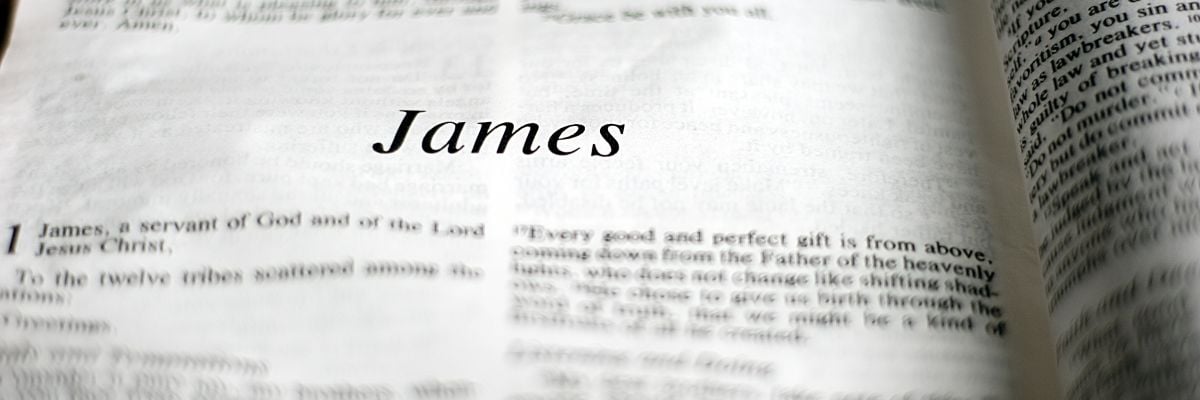
James 2:24 is remarkably clear: “You see that a man is justified by works and not by faith alone.” Yet millions of Christians teach the opposite: They claim that we are “justified by faith alone”—saying good works are unnecessary for Christians in the process of justification.
This misconception is rooted in the misinterpretation of a few key texts, such as Romans 3:28: “For we hold that a man is justified by faith apart from works of law.” Romans 4:5 is another: “And to one who does not work but trusts him who justifies the ungodly, his faith is reckoned as righteousness.” On the surface, St. Paul seems to be saying works are not necessary for our justification or salvation in any sense, but that is not the case when we examine the context of these passages. Not only would this interpretation contradict the words of James 2, but it would also contradict Paul himself.
Work in Christ
Paul made very clear in Romans 2:6-8 that good works are necessary for attaining eternal life, at least for those capable of performing them: “For he will render to every man according to his works: to those who by patience in well-doing seek for glory and honor and immortality, he will give eternal life; but for those who are factious and do not obey the truth, but obey wickedness, there will be wrath and fury.”
So what about the fact that Paul also said we are “justified by faith apart from works of law?” He was writing to a church in Rome struggling with a very prominent first-century heretical sect known today as the “Judaizers.” These heretics taught that belief in Christ and obedience to the New Covenant was not enough to be saved. A man also had to keep the Mosaic Law (which, according to Hebrews 7:11-12, has been superseded in Christ) and be circumcised in order to be saved (cf. Acts 15:1-2). Paul gave us one clue—among many—that he had this sect in mind when he wrote in Romans 2:28-29, “For he is not a real Jew who is one outwardly, nor is true circumcision something external and physical. He is a Jew who is one inwardly, and real circumcision is a matter of the heart, spiritual and not literal . . . ” Paul told us in Colossians 2:11-12 that this true “circumcision of Christ” is baptism.
It is in this context that Paul says we are “justified by faith apart from works of law.” He did not in any sense say that works are unnecessary. He specified works of law because these were the works without which the Judaizers were claiming one “cannot be saved.”
Paul does not specifically say works of law in Romans 4:5, but if we read from Romans 3:28 to Romans 4:5 and beyond, the context makes it unmistakable: Paul was referring to circumcision in particular and the same “works of law” he was referring to in Romans 3:28. Romans 4:5-10 will suffice to make the point:
And to one who does not work but trusts him who justifies the ungodly, his faith is reckoned as righteousness . . . Is this blessing pronounced only upon the circumcised, or also upon the uncircumcised? We say that faith was reckoned to Abraham as righteousness. How then was it reckoned to him? Was it before or after he had been circumcised? It was not after, but before he was circumcised.
Paul used the example of the “Judaizers” to teach the truth about the nature of justification and works. The works that justify us—as we saw in Romans 2:6-11 and James 2:24—are works done in Christ. Indeed, in Romans 2:4, before Paul even begins to talk about the works we must do to be saved, he says, “Knowest thou not, that the benignity of God leadeth thee to penance” (Douay-Rheims). It is only God’s goodness that leads us to repentance so that we can perform good works. How do we get “in Christ” according to Paul? Through baptism: “Do you not know that all of us who have been baptized into Christ Jesus were baptized into his death? We were buried therefore with him by baptism into death . . .” (Rom 6:3-4). It is only after we are in Christ and trusting in the power of his grace at work within us that we have the power to remain in him: “Therefore, since we are justified by faith, we have peace with God through our Lord Jesus Christ. Through him we have obtained access to this grace in which we stand and we rejoice in our hope of sharing the glory of God” (Rom 5:1-2).
Moreover, in Romans 6:16, Paul tells us that after baptism, obedience to Christ leads us to justification while sin will lead us to death (see also Romans 6:23): “Do you not know that if you yield yourselves to any one as obedient slaves, you are slaves of the one whom you obey, either of sin, which leads to death, or of obedience, which leads to righteousness” (Gk. eis dikaiosunen, unto justification).
Paul’s emphasis is not just on good works, but works done in and through the power of Christ. Thus, in Romans 8:1-14,Paul tells us in no uncertain terms that we must be in Christ in order to do works that please God.
There is therefore now no condemnation for those who are in Christ Jesus . . . who walk not according to the flesh but according to the Spirit . . . and those who are in the flesh cannot please God . . . So, then, brethren, we are debtors, not to the flesh, to live according to the flesh—for if you live according to the flesh you will die, but if by the Spirit you put to death the deeds of the body you will live. For all who are led by the Spirit of God are the sons of God.
Remember that Paul is emphasizing our continuing in Christ, in his grace or “kindness” as he says in Romans 11:22. “Note then the kindness and severity of God: severity toward those who have fallen, but God’s kindness to you, provided you continue in his kindness; otherwise you too will be cut off.”
Work through Love
When Paul wrote his letter to the Galatians, he had these same “Judaizers” in mind:
Let me ask you only this: Did you receive the Spirit by works of the law, or by hearing with faith? Are you so foolish? Having begun with the Spirit, are you now ending with the flesh . . . Now I Paul say to you that if you receive circumcision, Christ will be of no advantage to you. I testify again to every man who receives circumcision that he is bound to keep the whole law. You are severed from Christ, you who would be justified by the law; you have fallen away from grace. For through the Spirit, by faith, we wait for the hope of righteousness (Gk. dikaiosoune, justification). For in Christ Jesus neither circumcision nor uncircumcision is of any avail, but faith working through love. (Gal 3:2-3, 5:2-6)
Evidently, some of the Galatians were giving in to the false teaching that commanded them to return to the Law of Moses for salvation. He warns them that returning to the old Law is to reject Christ. But he in no way even hints at any idea of a “justification by faith alone” that would deny the necessity of “faith working through love.” Paul writes in the simplest of terms, in Galatians 5:19-21 and 6:7-9, that if Christians allow themselves to be dominated by their “flesh,” or lower nature, they will not make it to heaven. While on the flip side, Christians will only reap the reward of eternal life if they continue to “sow to the Spirit” or perform good works:
Now the works of the flesh are plain: immorality, impurity, licentiousness, idolatry, sorcery, enmity, strife, jealousy, anger, selfishness, dissension, party spirit, envy, drunkenness, carousing and the like. I warn you, as I warned you before, that those who do such things shall not inherit the kingdom of God . . . Do not be deceived; God is not mocked, for whatever a man sows, that he will also reap. For he who sows to his own flesh will from the flesh reap corruption (eternal death); but he who sows to the Spirit will from the Spirit reap eternal life. And let us not grow weary in well-doing, for in due season we shall reap, if we do not lose heart.
Work out Salvation
Ephesians 2:8-9 declares: “For by grace you have been saved through faith; and this is not your own doing, it is the gift of God—not because of works, lest any man should boast.” This is another text commonly used to dismiss good works as necessary for salvation in the life of a Christian. However, once again, context is the key to understanding Paul. In verses 4-6, he says: “But God, who is rich in mercy, out of the great love with which he loved us, even when we were dead through our trespasses, made us alive together with Christ . . . and raised us up with him . . .”
Context reveals that St. Paul was talking about the initial grace of salvation or justification by which we are raised from death unto life. The construction of the Greek text of Ephesians 2:8-9 makes clear that both grace and faith are entirely unmerited. Many Protestants are shocked to discover this is precisely what the Catholic Church teaches—and baptizes babies to prove it. How much more can the Church do to demonstrate this truth? What kind of works could a newborn baby have done to merit anything? However, once that baby grows up and reaches the age of accountability, he must begin to “work out [his] own salvation with fear and trembling; for God is at work in [him], both to will and to work for his good pleasure” (Phil 2:12-13). Or, as Paul says in Ephesians 2:10: “For we are his workmanship, created in Christ Jesus for good works, which God prepared beforehand, that we should walk in them.”
Are we justified or saved by faith, according to Jesus? Certainly! But by faith alone that would exclude works in every sense? No way. In John 11:25, we read: “I am the resurrection and the life; he who believes in me, though he die, yet shall he live.” That is faith. Yet, in Matthew 19:17-19, Jesus declared: “. . . If you would enter life, keep the commandments . . . You shall not kill, you shall not commit adultery, you shall not steal, you shall not bear false witness, honor your father and mother, and, you shall love your neighbor as yourself.” That is works.
In Matthew 12:37, Jesus puts any thought of justification by faith alone to rest: “. . . for by your words you will be justified, and by your words you will be condemned.”



